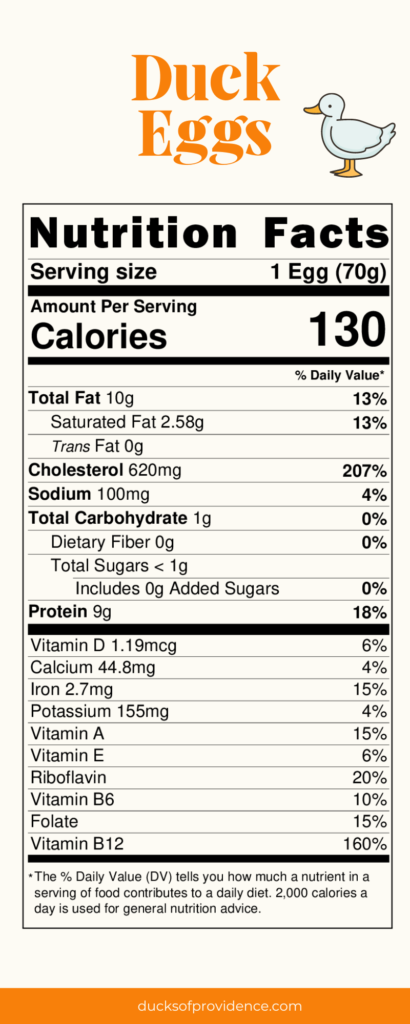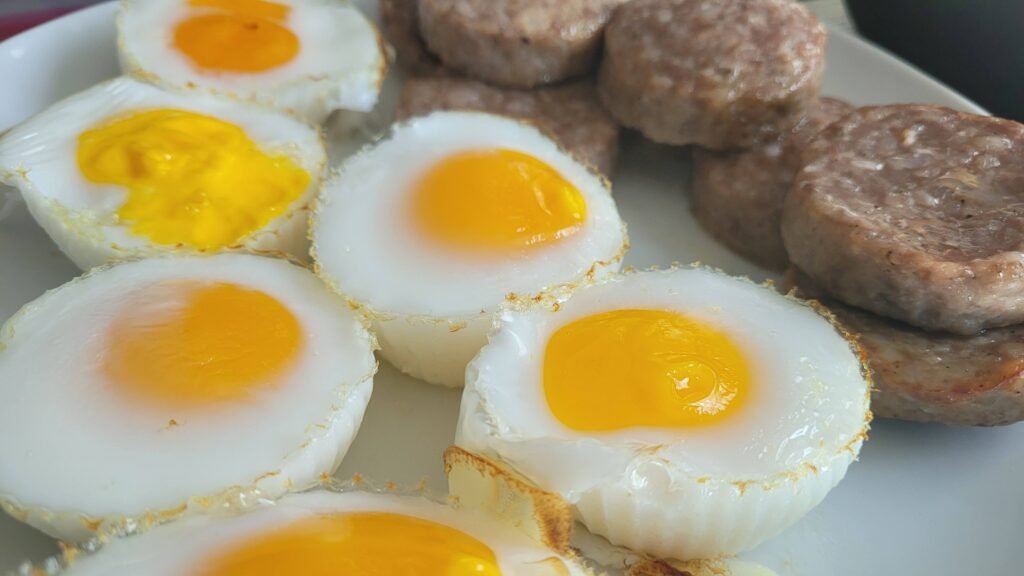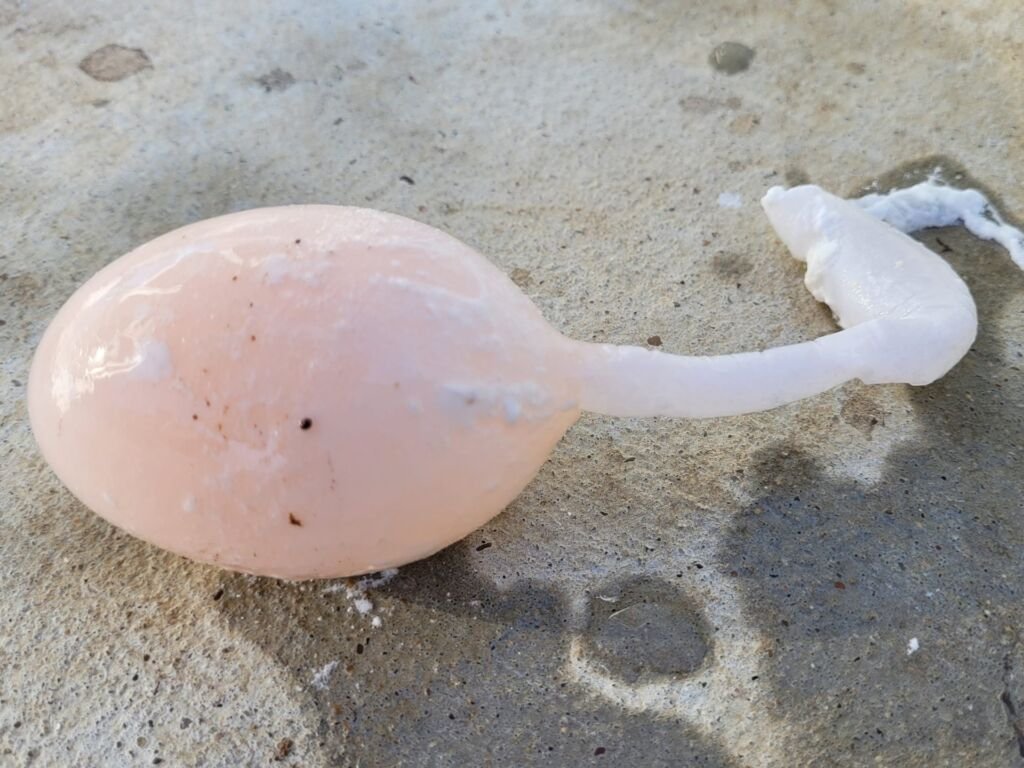Last updated on July 14th, 2024 at 02:44 pm
Have you ever wondered whether duck eggs taste similar to chicken eggs? Many people wonder about this, and this post is here to provide you with the answers you seek about duck eggs vs chicken eggs. We’ll explore the unique qualities of both types of eggs, breaking down the differences and similarities.

Flavor Profile: Do Duck Eggs Taste Like Chicken Eggs?
Duck eggs boast a flavor profile that distinguishes them from their chicken counterparts. This distinction arises primarily from differences in composition and nutrient content.
1. Rich and Full: Duck eggs have a richer, stronger flavor than chicken eggs. Thanks to their higher fat content, they taste fuller and more satisfying, adding a luxurious touch to dishes.
2. Creamy Texture: Another thing people love about duck eggs is their creamy texture. They’re smoother and silkier than chicken eggs, making dishes feel more indulgent.
3. Bold Flavor: Duck eggs pack a punch with their bold flavor. Their stronger taste adds depth to dishes, giving them a more exciting flavor profile.
4. Subtle Gaminess: Some people notice a subtle gaminess in duck eggs, which you don’t get with chicken eggs. It’s a bit different and adds an interesting twist to dishes, especially for those who enjoy exploring new flavors.
5. Versatility: Duck eggs remain remarkably versatile in the kitchen despite their distinct flavor profile. They adapt well to various cooking methods and pair harmoniously with a diverse array of ingredients, offering endless possibilities for culinary experimentation.
In summary, duck eggs’ flavor profile is characterized by richness, creaminess, robustness, and subtle gaminess, making them a prized ingredient for chefs and home cooks alike seeking to elevate their culinary creations.
Texture Analysis: How Do Duck Eggs compare to Chicken Eggs?
Now, let’s take a look at the texture of duck eggs compared to chicken eggs.
Notably, duck eggs possess a larger yolk-to-white ratio, resulting in a denser and silkier texture, almost like a velvety custard. They’re a great choice for adding something special to your cooking adventures!
This difference in texture can give dishes prepared with duck eggs a luxurious feel, making them particularly appealing to those who enjoy a more decadent eating experience.
Additionally, duck eggs are often favored for baking due to their richer texture, which results in moist and tender baked goods. So, if you’re looking to elevate your culinary creations with a richer texture and enhance your baking endeavors, duck eggs might be the perfect choice.
Structural Attributes: Duck Eggs vs Chicken Eggs
Now, let’s talk about the physical characteristics of duck eggs compared to chicken eggs. Duck eggs typically have a thicker shell, which makes them sturdier and less likely to crack than chicken eggs. This durability makes duck eggs easier to handle and store, providing added convenience in the kitchen.
Additionally, duck eggs are generally larger in size than chicken eggs, with both the shell and the egg itself being bigger. Their larger size contributes to a higher yolk-to-white ratio, resulting in a denser and richer texture in dishes, especially in baked goods. So, if you’re looking for eggs that are both robust, versatile, and larger in size, duck eggs might be the ideal choice for your cooking and baking adventures.
In terms of average sizes and weight, duck eggs are typically larger and heavier than chicken eggs. While chicken eggs usually weigh around 50 to 60 grams, duck eggs can weigh anywhere from 70 to 90 grams or more, depending on the breed of duck.

Nutritional Value: Duck Eggs vs Chicken Eggs
In terms of nutrition, duck eggs generally contain more protein, fat, and calories than chicken eggs. They also tend to have higher levels of certain vitamins and minerals, including vitamin B12, vitamin D, and selenium. However, duck eggs also have higher cholesterol content than chicken eggs.
Here’s a simplified comparison of the nutritional content of duck eggs and chicken eggs per 100 grams (From the USDA):
Duck Eggs:
- Calories: Around 185 kcal
- Protein: Approximately 13 grams
- Fat: Around 13 grams
- Cholesterol: About 884 mg
- Vitamin B12: Higher levels compared to chicken eggs
- Vitamin D: Higher levels compared to chicken eggs
- Selenium: Higher levels compared to chicken eggs
Chicken Eggs:
- Calories: Around 140 kcal
- Protein: Approximately 13 grams
- Fat: Around 9 grams
- Cholesterol: About 373 mg
- Vitamin B12: Lower levels compared to duck eggs
- Vitamin D: Lower levels compared to duck eggs
- Selenium: Lower levels compared to duck eggs
It’s important to note that these values are approximate and can vary based on factors such as the diet and breed of the birds. Additionally, individuals with dietary restrictions or health concerns should consult with a healthcare professional or nutritionist before making significant changes to their diet.


Culinary Applications of Duck Eggs
Due to their distinctive flavor and texture, duck eggs are a prized ingredient in gastronomy. They offer a versatile canvas for culinary experimentation. Their unique attributes lend themselves well to a myriad of preparations, including omelets, quiches, and soufflés, where their rich, creamy nature can shine.
- Baking: Duck eggs are highly prized by bakers for their rich flavor and superior texture. Their higher fat content and larger yolks make them ideal for baking cakes, pastries, cookies, and bread. Duck eggs impart a moist and tender crumb to baked goods, elevating them to a gourmet level.
- Egg-based Dishes: Duck eggs are perfect for egg-centric dishes like omelets, quiches, frittatas, and scrambled eggs. Their creamy texture and robust flavor enhance the taste and mouthfeel of these savory delights. Whether enjoyed for breakfast, brunch, or dinner, duck eggs add a delicious depth of flavor and luxurious creaminess to any meal.
- Custards and Desserts: Pastry chefs favor duck eggs for making custards, puddings, ice creams, and other desserts. The higher fat content and larger yolks of duck eggs create a silky-smooth texture in custards and puddings, resulting in decadent treats with a velvety mouthfeel. From crème brûlée to homemade ice cream, duck eggs lend a rich and indulgent quality to sweet confections.
- Noodles and Pasta: Duck eggs are traditionally used in making fresh pasta and noodles, adding richness and flavor to the dough. The larger yolks provide a vibrant yellow color and a tender bite to pasta dishes. Whether rolled into sheets for lasagna, cut into ribbons for fettuccine, or shaped into dumplings for gnocchi, duck egg pasta elevates the dining experience with its luxurious texture and taste.
- Mayonnaise and Sauces: Duck eggs are an excellent choice for making homemade mayonnaise and sauces. Their higher fat content and larger yolks result in a creamier and more flavorful emulsion, perfect for dressing salads, sandwiches, and seafood dishes. Duck egg mayonnaise adds a gourmet touch to any meal, while sauces made with duck eggs boast a rich and velvety consistency that enhances the flavors of accompanying dishes.
These examples illustrate the versatility of duck eggs in various culinary applications, offering endless possibilities for creative cooking and baking endeavors.

How Many Duck Eggs Equal A Chicken Egg?
Duck eggs are approximately 30% larger than a medium chicken egg, weighing between 3 to 3-½ ounces (70 to 90 grams). While some suggest using two duck eggs to replace three chicken eggs in recipes, I prefer a one-to-one ratio when substituting them, even in baking. I consistently achieve satisfying results with this approach.
Conclusion:
In conclusion, while duck eggs and chicken eggs share foundational similarities, they differ nuancedly in their flavor, texture, and structural attributes. By comprehending these distinctions, individuals can make informed choices when selecting eggs for culinary endeavors, thereby enriching their gastronomic experiences.
As we conclude our exploration of duck eggs versus chicken eggs, I invite you, dear reader, to share your favorite recipe featuring duck eggs. Join the conversation by sharing your recipe in the comments below, and let’s continue to inspire each other in our culinary adventures with these extraordinary eggs! ⬇️




